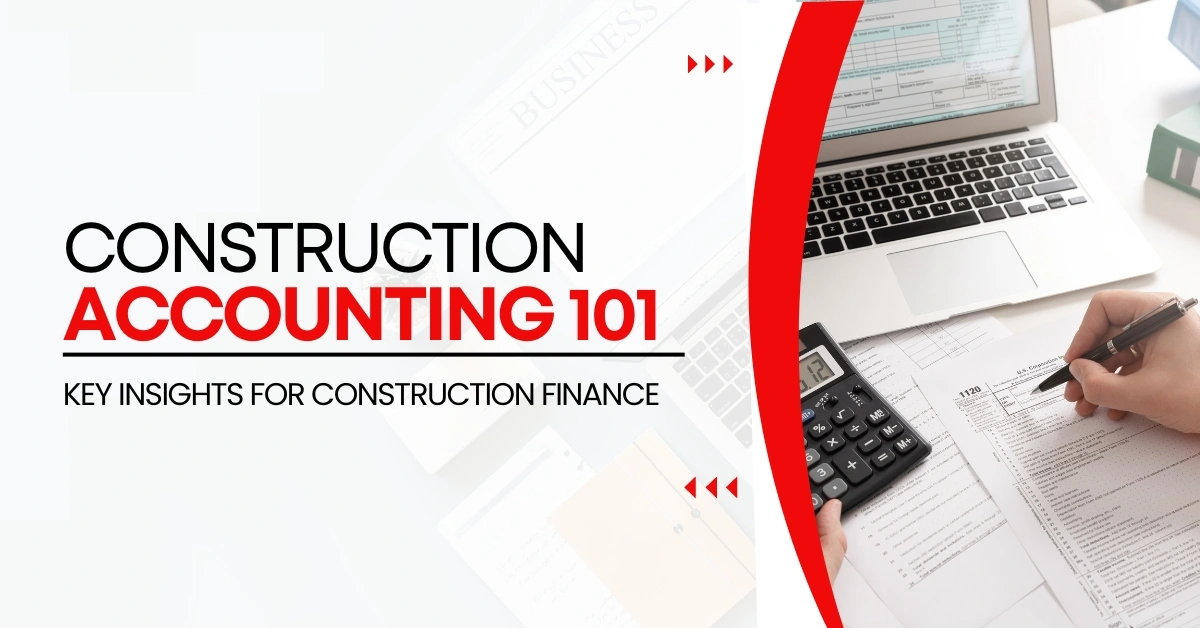Master Your Financials with Effective Construction Accounting Strategies
Master Your Financials with Effective Construction Accounting Strategies
Blog Article
Recognizing the Significance of Building And Construction Bookkeeping for Effective Task Management

Function of Construction Accountancy
Building and construction bookkeeping acts as the backbone of economic monitoring in the building sector, ensuring that jobs are completed within budget plan and economic purposes are satisfied. construction accounting. This specific accounting approach addresses the one-of-a-kind obstacles dealt with in building and construction tasks, including differing job durations, rising and fall prices, and several stakeholders
One of the main roles of building and construction accountancy is to provide exact expense evaluation and tracking throughout the project lifecycle. This assists in enlightened decision-making, making it possible for job supervisors to adjust sources and timelines successfully. Furthermore, building accounting enhances money circulation management by checking accounts receivable and payable, hence making sure that funds are offered for timely payments to providers and subcontractors.
Additionally, building bookkeeping help in compliance with industry guidelines and coverage demands. It gears up project supervisors with the needed financial information to prepare in-depth financial declarations, which are necessary for audits and economic evaluations. By maintaining clear documents, construction audit promotes openness and responsibility, crucial parts in constructing count on amongst stakeholders. Ultimately, the duty of construction audit prolongs past mere monetary tracking; it is essential to strategic preparation and functional efficiency, driving the success of building projects in a competitive landscape.
Trick Components of Building Accountancy

Budgeting establishes an economic framework that guides task execution, allowing supervisors to assign sources effectively and anticipate possible monetary obstacles. Precise cost monitoring is vital for monitoring expenditures in real-time, aiding to recognize variations between forecasted and real expenses. This makes it possible for timely adjustments to maintain the task on budget plan.
Moreover, monetary reporting supplies stakeholders with a clear photo of the job's financial health and wellness. Normal reports, such as earnings and loss statements and money circulation analyses, promote informed decision-making and improve openness among all celebrations entailed.
Additionally, conformity with sector regulations and accountancy standards is important. This ensures that monetary methods are not just effective however likewise lawful, safeguarding the organization against legal consequences. By incorporating these key elements, building and construction bookkeeping promotes an organized approach to managing monetary sources, inevitably adding to the successful completion of building jobs.
Advantages for Task Supervisors
Leveraging efficient building accountancy methods supplies job managers with a wide variety of benefits that improve both operational efficiency and financial oversight. One significant benefit is boosted budget plan administration. Accurate tracking of profits and costs allows project supervisors to check economic efficiency in real time, ensuring tasks continue to be within budget plan and helping with timely changes when needed.
Moreover, building accounting simplifies capital monitoring, making it possible for job managers to prepare for monetary demands and enhance resource allowance. By comprehending money inflows and outflows, they can much better handle settlements to employees, vendors, and subcontractors, thereby avoiding pricey delays.
In addition, robust accountancy systems provide detailed coverage capabilities. Task managers can generate records that offer insights right into task success, expense differences, and resource use. This data-driven strategy fosters notified decision-making, permitting managers to identify prospective concerns proactively and apply corrective steps.
Last but not least, adherence to construction accountancy criteria ensures compliance with governing and lawful requirements, reducing the danger of charges or disagreements. Overall, effective building accountancy equips job supervisors with the devices essential to drive task success, boost stakeholder self-confidence, and advertise lasting business development.
Usual Obstacles in Building And Construction Accounting
Many project supervisors run into substantial obstacles in building and construction construction accounting accountancy that can impede job success. One of the primary challenges is the intricacy of tracking numerous work websites, each with distinct budgets, timelines, and source appropriations. This calls for careful interest to information, which can be frustrating without a robust bookkeeping system in place.
Additionally, rising and fall product expenses and labor rates can make complex budget plan administration, making accurate projecting tough. Job managers often battle to resolve these expenses with actual expenses, causing prospective financial disparities.
Additionally, building accounting entails compliance with numerous guidelines, consisting of tax obligation responsibilities and labor laws. Browsing these guidelines can be challenging, specifically for managers that may not have a strong accountancy background.
An additional considerable obstacle is managing capital, which is critical in the building industry. Delays in invoicing, settlements from clients, or unforeseen project modifications can develop money circulation shortages, go to my blog jeopardizing the job's progress.
Finally, reliable communication between task managers, accountants, and area groups is important. Misconceptions can cause incorrect monetary coverage, even more making complex project administration initiatives. Addressing these difficulties proactively is crucial for successful construction accountancy.

Ideal Practices for Effective Accounting
While browsing the intricacies of building and construction accountancy can be overwhelming, taking on finest methods can substantially improve financial management and task success. One basic method is preserving accurate and prompt documents. Applying durable audit software program tailored to construction tasks can simplify data entry, invoicing, and reporting, saving and reducing mistakes time.
Furthermore, establishing a clear spending plan and routine monitoring versus this budget are crucial. Using a system of regular financial testimonials allows task managers to recognize variations early, facilitating prompt decision-making. It is also necessary to different project expenses into indirect and straight classifications, making it possible for clearer understandings into productivity.
Another finest technique includes cultivating open communication amongst all stakeholders. Normal updates and collective conversations about economic status can make sure everyone is lined up and educated. Training personnel in construction-specific audit principles additionally boosts competency and precision.
Last but not least, guaranteeing conformity with pertinent bookkeeping requirements and laws is non-negotiable. Regular audits and interior testimonials add to transparency and responsibility, constructing trust fund with stakeholders and clients. By concentrating on these i thought about this finest methods, building and construction companies can optimize their bookkeeping processes, eventually driving project success and economic stability.
Conclusion
To conclude, building audit plays a pivotal role in guaranteeing successful job monitoring by helping with precise economic oversight and boosting decision-making. By incorporating vital parts such as price estimate, capital monitoring, and conformity, task supervisors can browse typical difficulties and take advantage of finest methods for efficient accountancy. Eventually, a robust construction audit structure not just safeguards budget plan stability but also contributes to the total economic wellness of building projects, fostering lasting success within the market.
By integrating these key parts, building and construction accountancy promotes a structured strategy to taking care of monetary resources, inevitably contributing to the successful conclusion of building projects.
Accurate monitoring of costs and revenues allows task managers to check monetary performance in actual time, guaranteeing tasks continue to be within spending plan and assisting in timely changes when needed.
Project supervisors can generate records that provide understandings into task success, price variations, and source use.Many job supervisors come across significant difficulties in building and construction bookkeeping that can prevent job success. construction accounting. Inevitably, a robust building audit framework not just safeguards budget stability yet also contributes to the total financial health and wellness of building and construction tasks, fostering lasting success within the sector
Report this page